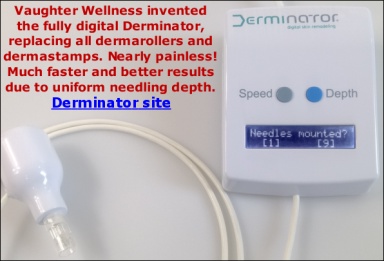Cyn;977 wrote: Wow K, you are awesome! Thanks for all the great information.
The lotion i use is Neostrata Smoothing Cream (Level 3). I started with their level 1 which I think only has 4 percent AHA in it, then worked my way up to their level 3 cream. I actually thought 10 percent was a lot, but I guess not?
I have the AMBI cream but was afraid to use it after I read some horror stories on the internet. Perhaps i will give it a try and see if i have any reactions.
So in what order would I use those four products? I suppose the exfoliant first and the sunscreen last (or every day).., and what exactly is the function of retinoids? (Sorry, I am a newbie.) I'lll google it now ..
I also had concerns abotu sunscreens and toxicity.. did some reading that suggested they should be used in moderation. What do you think about this? In the past I've used mineral makeup as a natural sunscreen in place of a lotion with spf in it. I suppose the toxicity leve depends on the lotion?
Base on what you have provided in this thread, I am going to take a guess on your skin type using Dr. Leslie Bauman Skin Type Solution terminiology. I believe you OSP(W or T); that is, your skin type is Oily, Sensitive, Pigmented, and the only think I am not sure is whether your skin is wrinkle or tight. I highly encourge you to take the free questionaire (and be honest about it) to find out your complete and accurate skin type -->
LINK. You must register before you can begin with the quiz. You should join the forum there if you want some skin care regimen solutions!
Well, if my guess is correct about you being oily. I highly suggest you reconsider buying cream-base products. These types of products tends to heavy and thick that include emollients and waxes and film-forming agents that can be detrimental for acne-prone skin. You should incorporate a skin care regimen that is tailor for your skin type! Use a water-soluble cleanser the rest of your leave-on products should have at light lotion or gel or liquid consistency because they absorb into your skin a lot quickier and there is minimal risk of clogging your pores and causes acne havoc. If you have dry areas, then use a fragrance-free light lotion and apply over those areas. Body lotion works.
In addition to your daily 10% AHA product, your hyperpigmentation will be benefited further with a series of superficial or lunchtime chemical peels! I am think 30-50% glycolic or 50-70% lactic. I am not going to suggest you do that on your own so I suggest you see your licensed esthetician or dermatologist for that procedure! Not only will you get rid of skin discoloration faster, you get smoother skin and less wrinkled. Exfoliation helps the to better penetrate retinoid and hydroquinone. Chemical peels are costy!
The order of products may be exfoliant and sunscreen in the morning, retinoid & hydroquinone at night, follow by moisturizer (optional). If you have acne medication apply that in the morning. I am specifically referring to benzoyl peroxide because it does counteract with Tretinoin. If you like to incorporate vitamin C in ascorbic acid form, you should not mix with retinoid. But Vitmain C can be mixed with hydroquinone.
Another thing, you say you use mineral make up, I am think you are referring to mineral powder. Correct me if I am wrong. If you are solely dependent on the powder as your sunscreen, I think you need to change that because it does not provide liberal coverage for your skin from the sun, which can very much negate any skin lightening benefits you want to achieve. Why? When you are dusting on your powder, there is no guarantee an even layer of powder still stick onto your skin (which it should to provide protection). Here is an easy to read article on this -->
LINK . If you prefer only natural sunscreen active like titanium dioxide or zinc oxide then you should look into Neutrogena and Blue Lizard line of products. Be cautions that their products tend to be thick and for dry skin types; also, for darker complexion more than likely will leave a whitish tinge. OR, you can use makeup with physical active like L'Oreal True Blend or Almay (check their ingredient list). Make up will be better since they are tinted. L'oreal has a better collection of colors. I hope you can find one that fits your skin tone. Also, you can reapply your sun protection with mineral only pressed powder which you can find from Neutrogena.
Also, you shouldn't be dissuaded by "horror stories" on the internet. A lot of them are anecdotal with no scientific backup. I encourage you to start using Google Scholar or PubMed for specific ingredient or review on regimens and ingredients. If you don't understand the article, you can always ask your dermatologists. I have a feeling you are one of those consumer that follows that claims of the cosmetic industry, much of it is baloney and untrue. here is an article if you fall in that category! -->
LINK two vidoes you might like to view!
[video]http://www.dermtv.com/age-spots[/video]
[video]http://www.dermtv.com/sunscreen-really-safe[/video]
[video]http://www.dermtv.com/chemical-peels[/video]
Best wishes
[update: I also want to add that you need to be patient with skin lightening. It does not happen over night or within a week. I found a video of a dark skin consumer who went through a series of chemical peels if you like to see -->
LINK]





